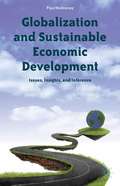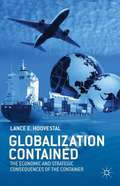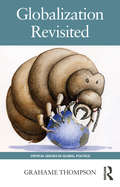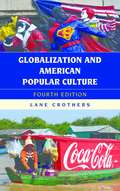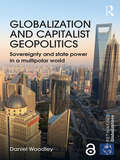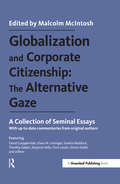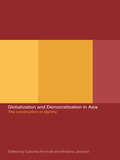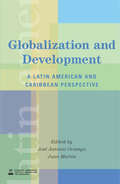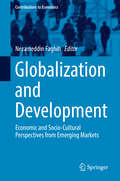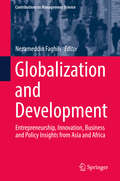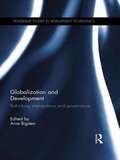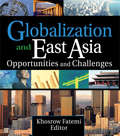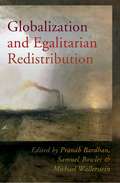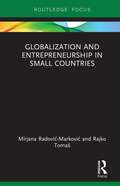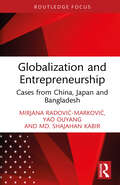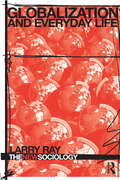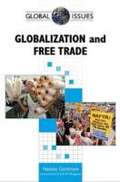- Table View
- List View
Globalization And Sustainable Economic Development
by Piya MahtaneyIn a world in transition and an era of transformation, Mahtaney calls for reflection and an analysis of a wide canvas of global economic experience. Her new work initiates a thorough review of the strategies and policies that have been pursued over the past two decades. The economic meltdown compelled the beginning of the next phase of globalization and she contends that the future will see an increase in globalization. As crucial questions arise about the direction in which globalization is headed and the sustainability of economic growth and reform, the fundamental objective of this exciting work is to elucidate crucial insights about the next phase of development in the world economy.
Globalization Contained
by Lance E. HoovestalExamining the global significance of the freight container, with particular emphasis on the perspectives of the US and China, Globalization Contained considers the implications of the freight container as an agent of change for the future of the global economy and global security.
Globalization Drives Strategic Product Switching
by Marialuz Moreno Badia Veerle Slootmaekers Ilke Van BeverenA report from the International Monetary Fund.
Globalization Past, 1850-1914 (A)
by Sophus A Reinert Federica GabrieliOn the evening of 3 August 1914, British Foreign Secretary Lord Edward Grey contemplated whether to advice King and Parliament to declare war on Germany in the wake of the country's invasion of Belgium, or to stay out of what quickly was becoming a world war triggered by a royal assassination in Sarajevo. Over the past century, the said world had become woven together in ways never before seen, and a truly global economy had emerged that many believed forever would banished the possibility of war altogether. But could trade really assure perpetual peace, and what ultimately mattered most; interest, or principles? The case considers the lessons to be had from the rise and fall of the last great period of globalization.
Globalization Past, 1850-1914 (A)
by Sophus A. Reinert Federica GabrieliOn the evening of 3 August 1914, British Foreign Secretary Lord Edward Grey contemplated whether to advice King and Parliament to declare war on Germany in the wake of the country's invasion of Belgium, or to stay out of what quickly was becoming a world war triggered by a royal assassination in Sarajevo. Over the past century, the said world had become woven together in ways never before seen, and a truly global economy had emerged that many believed forever would banished the possibility of war altogether. But could trade really assure perpetual peace, and what ultimately mattered most; interest, or principles? The case considers the lessons to be had from the rise and fall of the last great period of globalization.
Globalization Revisited (Critical Issues in Global Politics)
by Grahame ThompsonWritten by one of the leading scholars of global politics, Globalization Revisited is a major new book for students of globalization. It describes and explains the challenges to liberalism and the global order as result of globalizing forces - from financial interconnectedness to the growth of religious fundamentalisms. The text: provides a detailed analysis of the economic and financial aspects of globalization; examines the changes to global power and governance created by globalization including its effect on the sovereignty of the nation state; discusses recent trends such as the increased use of networks and social media; assesses the rise of globalizing fundamentalism; analyzes the challenges to globalization posed by contemporary events such as the global financial crisis. This book will be essential reading for all students of globalization, and will be of great interest to students of global politics and global governance.
Globalization and American Popular Culture (Globalization)
by Lane CrothersNow in a fully revised and updated edition, this concise and insightful book explores the ways American popular products such as movies, music, television programs, fast food, sports, and even clothing styles have molded and continue to influence modern globalization. Lane Crothers offers a thoughtful examination of both the appeal of American products worldwide and the fear and rejection they induce in many people and nations around the world. The author defines what we mean by "popular culture," how popular culture is distinguished from the generic concept of "culture," and what constitutes "American" popular culture. Tracing how U.S. movies, music, and TV became dominant in world popular culture, Crothers also considers the ways in which non-visual products like fast-food franchises, sports, and fashion have become ubiquitous. He also presents a fascinating set of case studies that highlight the varied roles American products play in a range of different nations and communities. Concluding with a projection of the future impact of American popular culture, this book makes a powerful argument for its central role in shaping global politics and economic development.
Globalization and Austerity Politics in Latin America
by Stephen B. KaplanIn an age of financial globalization, are markets and democracy compatible? For developing countries, the dramatic internationalization of financial markets over the last two decades deepens tensions between politics and markets. Notwithstanding the rise of left-leaning governments in regions like Latin America, macroeconomic policies often have a neoliberal appearance. When is austerity imposed externally and when is it a domestic political choice? By combining statistical tests with extensive field research across Latin America, this book examines the effect of financial globalization on economic policymaking. Kaplan argues that a country's structural composition of international borrowing and its individual technocratic understanding of past economic crises combine to produce dramatically different outcomes in national policy choices. Incorporating these factors into an electoral politics framework, the book then challenges the conventional wisdom that political business cycles are prevalent in newly democratizing regions. This book is accessible to a broad audience and scholars with an interest in the political economy of finance, development and democracy, and Latin American politics.
Globalization and Capitalist Geopolitics: Sovereignty and state power in a multipolar world (Rethinking Globalizations)
by Daniel WoodleyGlobalization and Capitalist Geopolitics is concerned with the nature of corporate power against the backdrop of the decline of the West and the struggle by non-western states to challenge and overcome domination of the rest of the world by the West. This book argues that although the US continues to preside over a quasi-imperial system of power based on global military preponderance and financial statecraft, and remains reluctant to recognize the realities global economic convergence, the age of imperial state hegemony is giving way to a new international order characterized by capitalist sovereignty and competition between regional and transnational concentrations of economic power. This title seeks to interrogate the structure of world order by examining leading approaches to globalization and political economy in international relations and international political economy. Breaking with the classical school, Woodley argues that geopolitics should be understood as a transnational strategic practice employed by powerful state actors, which mirrors predatory corporate rivalry for control over global resources and markets, reproducing the structural conditions for corporate power through the transnational state form of capital. In a period of increasing geopolitical insecurity and economic instability this title provides an authoritative yet accessible commentary on debates on capitalism and globalization in the wake of the financial crisis. It is valuable resource for students and scholars seeking to develop a deeper understanding of the historical determinants of the changing dynamics of neoliberal capitalism and their implications for world order.
Globalization and Competition
by Luiz Carlos Bresser PereiraGlobalization and Competition explains why some middle-income countries, principally those in Asia, grow fast while others are not successful. The author criticizes both old-style developmentalism and the economics of the Washington Consensus. He argues instead for a "new developmentalism" or third approach that builds on a national development strategy. This approach differs from the neoliberal strategy that rich nations propose to emerging economies principally on macroeconomic grounds. Developing countries face a key obstacle to growth, namely, the tendency to overvaluate foreign exchange. Instead of neutralizing it, the policy that rich countries promote mistakenly seeks growth through foreign savings, which causes additional appreciation of the national currency and often results in financial crises rather than genuine investment.
Globalization and Contestation: The New Great Counter-Movement (Rethinking Globalizations)
by Ronaldo MunckGlobalization is undoubtedly the great overarching paradigm of our era. However, there is still little agreement on what globalization actually ‘is’ and some do not accept that it ‘is’ anything at all. This new book addresses the contestation of globalization by the anti- or counter-globalization movement. To contest means to challenge, to call into question, to doubt, to oppose and to litigate. This study shows how globalization is ‘contestable’ in many different ways and how the counter-movements we have seen emerging over the last decade also ‘bear witness’ on behalf of an alternative human future. Ronaldo Munck presents an overarching framework that allows us to understand how globalization and its contestation are inextricably bound up with one another. This volume insightfully explores a number of case studies, including: the battle of Seattle in 1999 the World Social Forum peasant internationalism environmental movements and reactionary movements including: the US Patriot's movement, Islamic fundamentalist movements and other nationalist movements. Globalization and Contestation will be of great interest to all students and scholars of international relations, politics and of globalization and global governance in particular.
Globalization and Corporate Citizenship: A Collection of Seminal Essays
by Malcolm McIntoshThe theory and practice of corporate citizenship and CSR have many alternative perspectives to the business-as-usual gaze. The essays in this volume encapsulate the essence of these alternative ideas and embrace the idea that progressive ways and means of this century do not lie in mainstream capitalist thinking. These pieces ask critical questions about the way we see the relationship between capitalism, business models and society – a subject not often discussed in non-academic literature. Globalization and Corporate Citizenship: The Alternative Gaze features contributions and new analysis from Klaus M. Leisinger, Chris Laszlo, David Coopperrider, Simon Zadek, Sandra Waddock and others. This title is one of a two-volume set – a collection of seminal and thought-provoking essays, drawn from the Journal of Corporate Citizenship’s archive, accompanied by new analysis and reflection from the original authors. Written by some of the most widely recognized academic and business pioneers and leaders of the corporate responsibility and global sustainability movement, the volumes make essential reference texts for anyone interested in the radically awakening new global political economy.
Globalization and Democratization in Asia: The Construction of Identity
by Catarina Kinnvall Jösson KinnvallGlobalization is a defining feature of our times, covering everything from economic and political issues to the spread of American culture. Its status is controversial, however with some viewing it as leading to greater development for all, while others see it as a threat to national cultures and democratic political life. This book shows how simplified such binary views are, and examines how various globalizing forces have affected Asian societies. It discusses the relationship between globalization, identity and democratic developments in Asia both theoretically and empirically, and aims to understand how economic, political and social forces interact and are mutually reinforced in Asian societies.
Globalization and Development
by Juan Martin Jose Antonio OcampoAward winning title! 'Globalization and Development' was selected as a 2003 'Notable Government Document' by the American Librarian Association (ALA) and GODORT (Government Documents Round Table). In this book, ECLAC (Economic Commission for Latin America and the Caribbean) draws upon the Latin American and Caribbean region's experience in order to formulate a historical and multidimensional assessment of the globalization process from the perspectives of developing countries.
Globalization and Development: Economic and Socio-Cultural Perspectives from Emerging Markets (Contributions to Economics)
by Nezameddin FaghihThis book presents economic and socio-cultural perspectives on globalization from emerging markets. It explores the links between globalization and development, and reveals the dynamics, strengths and weaknesses, trends in and implications of globalization in emerging market economies. Gathering papers by leading experts in the field, it shares essential insights into the history and status quo of globalization processes and structures; identifies the opportunities provided by and risks posed by globalization; and sheds light on the way to global peace. The topics addressed range from globalization development within the Group of Twenty (G20), populist events such as “Brexit” as a form of historical irony, and a zeitgeist analysis of the globalization spirit; to the evolution of higher education and public administrative systems under the weight of globalization; not to mention emerging topics such as the informal economy and new rules for fleecing the South in the newly globalized trade system.
Globalization and Development: Entrepreneurship, Innovation, Business and Policy Insights from Asia and Africa (Contributions to Management Science)
by Nezameddin FaghihOver time, globalization has evolved into a shared journey of humanity, involving entrepreneurship, innovation, business and policy advances around the world. This book explores the link between globalization and development, and reveals the dynamics, strengths and weaknesses, trends in and implications of globalization in Asia and Africa. Presenting papers by respected experts in the field, it shares essential insights into the status quo of globalization processes and structures, identifies the opportunities and threats that globalization faces, and sheds light on the path to global peace. Topics range from using fair-trade practices to compensate for the impacts of globalization; to lessons learned for tomorrow from Tunisia, Morocco and Jordan; as well as emergent topics such as global entrepreneurship capacity and developing the Chinese economy overseas.
Globalization and Development: Rethinking Interventions and Governance (Routledge Studies in Development Economics #102)
by Arne BigstenThe key challenge for achieving sustained development in developing countries relates to quality of domestic governance, which in turn is strongly affected by external interventions. Domestic governance includes politics, policy formulation, institution building and policy implementation. It is important for both international and domestic agents to understand how the interplay between external interventions and domestic governance affects social and economic outcomes. This volume presents a series of studies analysing the links between external interventions and domestic governance in the areas of economic, social and security policy. Key questions that are addressed here include: How do external interventions in economic, social and security areas affect domestic governance in developing countries? Is aid more effective in decentralised systems of government? What are the interactions between external interventions and domestic governance? How can external agents advance domestic governance? Due to its strong focus on external interventions and domestic governance, this book will be of interest to scholars of development studies across the social sciences, in addition to the fields of economics, political science, sociology and geography.
Globalization and Diversity: Geography of a Changing World (Second Edition)
by Lester Rowntree Martin Lewis Marie Price William WyckoffGlobalization and Diversity is an exciting contemporary approach to World Regional Geography that explicitly acknowledges the geographic changes that accompany today's rapid rate of globalization. Organizes each regional chapter into five thematic sections: Environmental Geography; Population and Settlement; Cultural Coherence and Diversity; Geopolitical Framework; Economic and Social Development.
Globalization and East Asia: Opportunities and Challenges
by Khosrow Fatemi Erdener KaynakLearn to apply the strategies used in East Asia&’s phenomenal economic expansion The phenomenal economic growth of many countries in East Asia has no historic parallel. Globalization and East Asia: Opportunities and Challenges examines different aspects of the economic performance of the region over the past three decades, with a focus on what it takes to replicate the experience elsewhere. Nineteen of the finest presentations from the 12th International Conference of the International Trade and Finance Association in Bangkok, Thailand, have been carefully selected and revised by their expert authors, providing powerful, practical economic development approaches that can be used to develop other economies.This comprehensive volume presents an insightful four-part view of the intricate economic workings of East Asia. The first part introduces the distinctive qualities of the policies that sparked economic growth and development. Part two provides comparative studies of different countries and industries in the region and an in-depth study of the East Asian area over the past fifty years. Part three presents sector specific studies within several countries, focusing on international finance. The fourth part spotlights important industry-specific elements and explores the future of globalization in relation to its effects on East Asia. Each chapter is extensively referenced, and several use tables and charts to clearly reinforce crucial points.Globalization and East Asia includes topics such as: the characteristics of East Asian economic growth-and how other areas will benefit the rapid economic growth of the region since the end of World War II an evaluation of efficiency and leveraging of assets comparing the United States and the Four Dragon (FD) industries structural weaknesses within Asian countries trade flows between the United States and Thailand- a bilateral study the progress of APEC&’s environmental cooperation financial resource flows during the 1990s Malaysian financial markets and the Asian financial crisis China&’s economic transition and exchange rate policies the use of dual production theory as a model in the world economy Thailand&’s telecommunications sector-and how it provides illustration for other sector specific industries in developing countries development of bilateral trade negotiations between the United States and Vietnam the status of United States apparel importsGlobalization and East Asia is important, insightful reading for researchers, scholars, and professionals specializing in regional economics and economic development.
Globalization and Egalitarian Redistribution
by Pranab Bardhan Samuel Bowles & Michael WallersteinCan the welfare state survive in an economically integrated world? Many have argued that globalization has undermined national policies to raise the living standards and enhance the economic opportunities of the poor. This book, by sixteen of the world's leading authorities in international economics and the welfare state, suggests a surprisingly different set of consequences: Globalization does not preclude social insurance and egalitarian redistribution--but it does change the mix of policies that can accomplish these ends. <P><P>Globalization and Egalitarian Redistribution demonstrates that the free flow of goods, capital, and labor has increased the inequality or volatility of labor earnings in advanced industrial societies--while constraining governments' ability to tax the winners from globalization to compensate workers for their loss. This flow has meanwhile created opportunities for enhancing the welfare of the less well off in poor and middle-income countries. Comprising eleven essays framed by the editors' introduction and conclusion, this book represents the first systematic look at how globalization affects policies aimed at reducing inequalities. The contributors are Keith Banting, Pranab Bardhan, Carles Boix, Samuel Bowles, Minsik Choi, Richard Johnston, Covadonga Meseguer Yebra, Karl Ove Moene, Layna Mosley, Claus Offe, Ugo Pagano, Adam Przeworski, Kenneth Scheve, Matthew J. Slaughter, Stuart Soroka, and Michael Wallerstein.
Globalization and Entrepreneurship in Small Countries (Routledge Focus on Business and Management)
by Mirjana Radović-Marković Rajko TomašThe changeable business environment requires a new business framework and an understanding of the global market trends and the culture that will impact on business. Globalization and Entrepreneurship in Small Countries considers important business principles and makes them accessible for entrepreneurs and small business owners. It addresses the role of managers and leaders and management techniques in the context of global strategy of companies, as well as the culture diversity that comes with globalization of organizations. To meet the constantly changing conditions and demands, business must transcend boundaries to get what it needs regardless of where it exists – geographically, organizationally, and functionally. This book draws together earlier literature on SME development and internationalization from disparate sources into a cohesive body of work, which traces the evolution of our understanding of the topic. It explores just how globalization affects the demand for business and entrepreneurship, and will therefore be of interest to researchers, academics, policymakers, and students in the fields of entrepreneurship, globalisation, organisational studies, and SMEs development in small countries.
Globalization and Entrepreneurship: Cases from China, Japan and Bangladesh (Routledge Focus on Business and Management)
by Mirjana Radović-Marković Yao Ouyang Md. Shajahan KabirGlobalization and Entrepreneurship explores the transformative impact of digital technologies on entrepreneurship across three distinct, but interconnected nations. It presents a comprehensive analysis of how digital advancements and AI are reshaping traditional business models and fostering economic growth in China, Japan, and Bangladesh. With its focus on emerging trends and practical case studies, this book offers a thorough exploration of digital entrepreneurship’s role in driving innovation and addressing socioeconomic challenges in these regions. Readers will benefit from a multi-dimensional view of globalization’s effects on entrepreneurship, highlighting the unique contributions and interactions of China, Japan, and Bangladesh. The book examines the influence of digital transformation, AI, and globalization on business practices and economic development. It provides valuable insights into how different countries are adapting to and leveraging technological advancements for competitive advantage, offering actionable recommendations for policymakers, business leaders, and scholars interested in the future of global entrepreneurship. It is essential reading for academics, researchers, and practitioners in international business, digital entrepreneurship, and global economic studies. It is particularly useful for those interested in the strategic and practical implications of digital technologies in diverse economic contexts. Whether you are a scholar seeking to understand global entrepreneurial dynamics or a business leader aiming to navigate the complexities of international markets, this book offers critical insights into the evolving landscape of global entrepreneurship.
Globalization and Environmental Reform: The Ecological Modernization of the Global Economy
by Arthur P. J. MolMany writers either glorify globalization or vilify it, particularly for its destructive environmental effects. In this book environmental sociologist Arthur Mol provides a more balanced understanding of the relationship between globalization and environmental quality. Mol bases his arguments on his theory of ecological modernization, which holds that although processes of modernization and globalization often result in environmental degradation, they also can encourage policies and programs designed to arrest degradation and improve environmental quality. Building on earlier ecological modernization studies that focused on Europe, North America, and East and Southeast Asia, Mol takes here a more global perspective. He also addresses the increasing roles of nonstate actors, especially international institutions, nongovernmental organizations, popular movements, and transnational corporations. After examining the confusion created by the failure to distinguish among globalization, global capitalism, and neoliberalism, Mol analyzes both globalization's destructive environmental consequences and its contribution to global environmental reform. Elaborating on the subject of reform, he focuses on three case studies, one involving the economic triad of the European Union, the NAFTA region, and Japan; one involving the relationship between the triad and developing countries; and one involving three developing countries: Vietnam, the Netherlands Antilles, and Kenya.
Globalization and Everyday Life (The New Sociology)
by Larry RayGlobalization and Everyday Life provides an accessible account of globalization by developing two themes in particular. First, globalization is an outcome of structural and cultural processes that manifest in different ways in economy, politics, culture and organizations. So the globalized world is increasingly heterogeneous, unequal and conflictual rather than integrated and ordered. Secondly, globalization is sustained and created by the everyday actions of people and institutions. Both of these have far-reaching consequences for everyday life and are fully explored in this volume. Larry Ray skilfully guides students through the various aspects of the globalization debate and illustrates key arguments with reference to specific topics including nation, state and cosmopolitanism, virtual societies, transnationals and development. This innovative book provides this information in a clear and concise manner suitable for the undergraduate student studying sociology, social geography, globalization and development studies.
Globalization and Free Trade
by Natalie GoldsteinIntended to be accessible to audiences at the high school level and up, this volume provides both a primer on issues of economic globalization and a guide to further research. It describes the historical and ideological development of laissez-faire and neoliberal economics and the debates about their implementation in the United States and around the world. It also presents a collection of primary source documents from US and international contexts, presents key facts and figures, lists relevant organizations and agencies along with their contact information, and provides an annotated bibliography. Annotation ©2007 Book News, Inc., Portland, OR (booknews.com)
